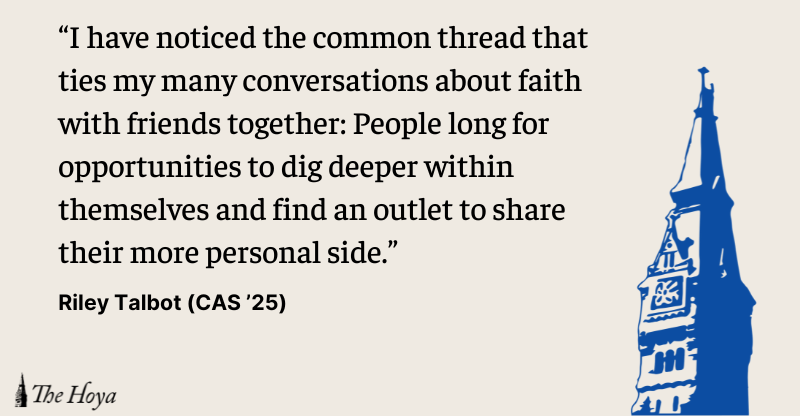While Georgetown students are told that they can specialize in almost any imaginable combination of subjects, there is one course of study that they cannot avoid: competition. Students and faculty alike are in a constant state of agitation to remain a step ahead of the competition. We are all engaged in the study and practice of how to rise to the top of the heap.
The university as a whole is also oriented toward being competitive with peer institutions – both Ivy League and non-Ivy, elite colleges. Various measures are used to evaluate competitiveness, but one in particular is worth noting. Institutional competitiveness among research universities is increasingly measured by the amount of federal grant dollars that are attracted to fund scientific research. That dynamic explains some of the visible thrill among university representatives about the recent windfall from federal stimulus funds that will enable construction of a new science building and, specifically, an institute for soft matter synthesis and metrology. All those federal dollars will be added to a ledger in which our competitiveness will be more favorably measured against other research centers.
Listening to this news, I found myself wondering about the larger purpose of staying ahead of the Joneses – particularly in an age when so many Americans went so heavily into debt pursuing the same goal. As an institution devoted to critical thinking, there’s a striking lack of reflection about the purpose or goal of competitiveness and the means by which we achieve that end. For instance, in an age of declining financial resources, one wonders what other activities will be curtailed for the sake of our pursuit of a deeper understanding of soft matter. What relevance does this particular research agenda have to the historic mission and character of Georgetown University? What of the lack of discussion that has attended the acceptance of stimulus dollars that are more deeply indebting the very students we strive to educate? Whose agenda are we helping to fulfill by accepting government funds for this research (under the “no free lunch” principle), and is it one that we have adequately discussed as a campus community?
Perhaps above all, what is meant by the stated purpose of being competitive? What end or purpose exactly are we seeking? This is a worthwhile question to explore in the aftermath of a financial crisis that can trace many of its roots to globalized demands to be competitive. Doubtless there is a salutary form of competitiveness that encourages us to more perfectly fulfill our God-given talents. But as a means to individual self-aggrandizement – or even as an end in itself – competitiveness becomes rapacious and encourages a willingness to succeed at any cost. We see its evidence daily in stories about doping among athletes, NCAA sports violations, political graft often involving fundraising or “influence peddling,” financial shenanigans to increase short-term profit and, yes, cheating to improve grades. A society devoted to the goals of competitiveness will necessarily invite not just the occasional ethical violation, but a broader culture of cutting corners in order to get ahead.
Georgetown invokes its Catholic and Jesuit heritage, but in the unquestioning embrace of the goal of competitiveness – based on standards imposed from outside – there is a danger in embracing the philosophy of Thomas Hobbes and his belief that human activity is reducible to an endless search for “power after power that ceaseth only in death.” The goal of modern science is to increase that power – particularly by extending human mastery over the natural world. Government funding for science research also has that basic aim in mind. But the signs from the financial world are telling us that a world of hyper-competitiveness is socially and politically damaging, and the news from the natural world is that the project of mastery is also one of diminishing returns.
Perhaps what is needed – more than an institute for soft matter synthesis – is a focus not on the competitive expansion of human power, but on how to govern the lust for dominion that motivates that project. Other questions and standards are needed beyond the comparison of federal funds. Can a society based foremost upon competition foster good character and the capacity to live within its means? Are there goods that we are tempted to sacrifice to competition – such as friendship, family, community, a virtuous life – that are needed to restrain an otherwise encompassing devotion to competition? Can Georgetown – given its historical and religious identity – model a different standard of excellence, and think critically about prevailing demands that too easily become ends in themselves? Maybe it’s metrology – the study of measurement – that we need, but a different measure than the one we have adopted in our drive to get ahead.
Patrick Deneen is an associate professor in the government department. He can be reached at deneenthehoya.com. Against the Grain appears every other Tuesday.”



















